|
|
|
Sort Order |
|
|
|
Items / Page
|
|
|
|
|
|
|
| Srl | Item |
| 1 |
ID:
192487
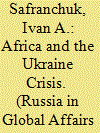

|
|
|
|
|
| Summary/Abstract |
The scale and global consequences of the Ukraine crisis do not allow even
countries that are not directly involved in the standoff to ignore it. Most
members of the international system have to respond to the current events
and formulate their position on the conflict. When analyzing these positions,
the epistemic community tries to explain what stands behind different
reactions to the crisis. The focus of academic work varies from the attitude
of a single country to cross-country comparisons. This paper, pertaining to
the latter category, presents a coordinate system to map the international
reaction to the Ukraine crisis, with special attention to African states. Using
the methods of cluster, correlation, and regression analyses, the authors
present an overall picture of the international reaction to the crisis over
time and highlight factors that can influence the positions of states. The
results show that the positions of African states cannot be easily explained
by material factors, but are rather the consequence of political choice, and
hence are subject to change. African states gravitate towards a neutral
position to stay equidistant from both sides in the confrontation. The
authors conclude that assertive attempts by the great powers to persuade
African states to solidarize with their positions may prove abortive.
|
|
|
|
|
|
|
|
|
|
|
|
|
|
|
|
| 2 |
ID:
093650
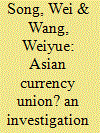

|
|
|
|
|
| Publication |
2009.
|
| Summary/Abstract |
This paper applies Optimum Currency Area (OCA) theory to investigate the suitability of Asian currency union and its membership, in which China is taken as the central country. Cluster analysis is applied for this study. Both hierarchical clustering and fuzzy clustering approaches are used. The study finds that Japan, Korea, Hong Kong, Malaysia, Philippines, Singapore, Thailand, Cambodia and Vietnam are most converged with China, and these countries are more likely to be the member countries of the Asian Currency Union.
|
|
|
|
|
|
|
|
|
|
|
|
|
|
|
|
| 3 |
ID:
175244


|
|
|
|
|
| Summary/Abstract |
Italy has a very low level of uptake of electric cars (ECs), equal to 0.6% for the year 2019, despite significant efforts put in place by policy makers to stimulate their use. This paper investigates the barriers to wider EC diffusion via a survey administered in 2019 to a representative sample (N = 870) of the Italian population. We discuss and rank the barriers, aggregate them via principal component analysis (PCA) on the basis of the polychoric correlation matrix, perform a cluster analysis and analyse the socio-economic determinants of the respondents. The findings of this paper suggest a series of improvements that could be made by various actors. To overcome the financial barriers to EC uptake, Italian policy makers should reinforce incentives at the national and local levels and car manufacturers should bring to the market cheaper ECs belonging to the A and B segments. The charging-related barriers require investments on fast charging stations along the main toll highways and a new regulation regarding multi-house dwellings. Finally, reliable and complete information is needed to enhance knowledge about the technological and environmental pros and cons of ECs.
|
|
|
|
|
|
|
|
|
|
|
|
|
|
|
|
| 4 |
ID:
168364
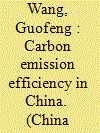

|
|
|
|
|
| Summary/Abstract |
Regional cooperation has become a new direction for China development. Indeed, carbon emission reduction is especially important to combat Climate change. In this paper, we use Direction Distance Function to estimate the overall carbon emission efficiency. We empirically estimate the spatial Moran'I and LISA cluster in China from 2005 to 2016. Our results show carbon emission efficiency presents the spatial pattern of gradually decreasing in “Eastern, Central, Western” and symmetrical distribution in “Southern, Central, Northern” of China. High efficiency spatial cluster areas mainly concentrate on the mid-east coastal provinces, which technical level and policies are better than those of the inland among the factors influencing carbo emission efficiency, energy structure, technology and urbanization have a significant impact. This paper will provide some scientific support to solve cooperation between province to combat carbon emission.
|
|
|
|
|
|
|
|
|
|
|
|
|
|
|
|
| 5 |
ID:
184056


|
|
|
|
|
| Summary/Abstract |
Collaboration with technological partners as an innovation strategy has become widespread in recent years, and all sectors are immersed in this process. In particular, the defence industry is characterised by the technological complexity of the products and services offered, together with a constant innovation process. However, data that allow us to identify characteristics that are found in collaboration contracts are not usually available in this sector. This paper addresses this gap in the literature by studying the different characteristics of both the technological partners and the development agreements for the 1999-2017 period. This is possible thanks to a database of more than 300 collaboration technology agreements between public and private organisations and the Spanish Ministry of Defence. The results provide the Ministry of Defence with a clear picture of the type of collaborations in the Defence industry, their partners and their behaviour under different economic conditions, which will help it identify the type of collaborations that can contribute to improving the design of its innovation strategy.
|
|
|
|
|
|
|
|
|
|
|
|
|
|
|
|
| 6 |
ID:
136235
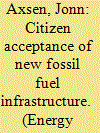

|
|
|
|
|
| Summary/Abstract |
Development of unconventional fossil fuels is generating controversy in North America, where citizen support or opposition can shape political decisions. This study explores the role of values in citizen perceptions. The case study is Canada׳s proposed Northern Gateway Pipeline (NGP), which would transport bitumen from Alberta׳s oil sands to British Columbia׳s (BC) northern coast for export. Data were collected in 2013 from a sample of Canadian citizens (n=2628). The survey instrument elicited citizen perceptions of the NGP, as well as values and attitudes. Respondents in the Alberta subsample are the most likely to support the NGP and to perceive economic benefits. Respondents in the BC subsample are the most likely to oppose the NGP and to perceive environmental risks. To explore heterogeneity in motivations among both subsamples, respondent clusters are constructed based on values. In both regions, opposition is highest in clusters with strong biospheric–altruistic values, while acceptance is highest in clusters with strong traditional values. Regional effects are also substantial; NGP acceptance is higher in each of Alberta׳s clusters relative to equivalent clusters in BC. Regional context seems to shape how values correspond with perceptions. Insights are drawn for energy project development, public consultation and energy planning.
|
|
|
|
|
|
|
|
|
|
|
|
|
|
|
|
| 7 |
ID:
109663


|
|
|
|
|
| Publication |
2011.
|
| Summary/Abstract |
Carbon markets are increasingly conscious of the social and environmental 'quality' of credits delivered by CDM projects. Consequently carbon credits are no longer viewed as a homogenous good and buyers now differentiate between credits supplied by different types of CDM project. The objective of this paper is to classify CER buyers according to their attitudes towards and preferences for CDM sustainability labels. K-means clustering was used to segment a sample of buyers into two clusters. The results indicate that two clear clusters exist with distinct profile patterns. Moreover, the results of discriminant analysis confirmed that the two-cluster solution was valid. Finally, the results of the chi-square analysis and a cross-tabulation showed that these two clusters were significantly different in: organization type; level of paid up capital; perception of sustainable development benefits; perception of return on investment; perception of image of the sustainability labeling; participation in the voluntary market; the project priority; knowledge in the sustainability label; attitude towards the host country's duty; and their willingness to pay.
|
|
|
|
|
|
|
|
|
|
|
|
|
|
|
|
| 8 |
ID:
027838


|
|
|
|
|
| Publication |
McGraw Hill Book Company, 1970.
|
| Description |
Xiv,347p.
|
|
|
|
|
|
|
|
|
|
|
|
Copies: C:1/I:0,R:0,Q:0
Circulation
| Accession# | Call# | Current Location | Status | Policy | Location |
| 006181 | 519.53/TRY 006181 | Main | On Shelf | General | |
|
|
|
|
| 9 |
ID:
096650


|
|
|
|
|
| Publication |
2010.
|
| Summary/Abstract |
In the European Union, the natural gas market is increasingly being liberalized. The liberalization process is aimed at leading to lower prices and higher volumes, and hence higher consumer welfare.
This paper focuses on the changes in performance in the natural gas retail market by analyzing the profit and financial position of the companies concerned over the first three years following the market liberalization. The balance sheets of 105 Italian companies in this sector are analyzed, after which a cluster analysis is performed employing the most significant performance indexes. The companies are then analyzed within each cluster with respect to age, size, geographical location and business diversification.
The results of our analysis show that the majority of companies attained a high level of performance, although this positive outcome was mitigated by the gradual decrease of the average values of performance indicators during the period concerned. The companies that achieve the best performances belong to longstanding business groups, are medium-large sized and are located in the north of the country. Regarding business diversification, in the first two years, the specialised companies outperformed the diversified companies.
|
|
|
|
|
|
|
|
|
|
|
|
|
|
|
|
| 10 |
ID:
097485


|
|
|
|
|
| Publication |
2010.
|
| Summary/Abstract |
In the European Union, the natural gas market is increasingly being liberalized. The liberalization process is aimed at leading to lower prices and higher volumes, and hence higher consumer welfare.
This paper focuses on the changes in performance in the natural gas retail market by analyzing the profit and financial position of the companies concerned over the first three years following the market liberalization. The balance sheets of 105 Italian companies in this sector are analyzed, after which a cluster analysis is performed employing the most significant performance indexes. The companies are then analyzed within each cluster with respect to age, size, geographical location and business diversification.
The results of our analysis show that the majority of companies attained a high level of performance, although this positive outcome was mitigated by the gradual decrease of the average values of performance indicators during the period concerned. The companies that achieve the best performances belong to longstanding business groups, are medium-large sized and are located in the north of the country. Regarding business diversification, in the first two years, the specialised companies outperformed the diversified companies.
|
|
|
|
|
|
|
|
|
|
|
|
|
|
|
|
| 11 |
ID:
150457


|
|
|
|
|
| Summary/Abstract |
Research on household energy conservation often categorizes targeted behaviours by their behavioural attributes (e.g., savings, cost, frequency). The most common distinction in the literature divides behaviours as follows: (1) low-impact, low-cost, repetitive behaviours that result in a loss of comfort or curtailment behaviours and (2) high-impact, high-cost, infrequent behaviours that result in no loss of amenities or efficiency behaviours. However, such categorizations have often been ad hoc and two-dimensional (e.g., low-impact vs. high-impact, low-cost vs. high-cost). In contrast, we systematically assess a large range of household energy-saving behaviours (N=261) across nine attributes – energy savings, cost, frequency of performance, required skill level, observability, locus of decision, household function, home topography, and appliance topography. By clustering behaviours according to these attributes, we discern four clusters of energy-saving behaviours: family style, call an expert, household management and weekend project. We discuss the implications of these clusters for intervention design.
|
|
|
|
|
|
|
|
|
|
|
|
|
|
|
|
| 12 |
ID:
162337
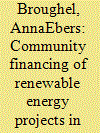

|
|
|
|
|
| Summary/Abstract |
Small-scale investors are gaining recognition as a valuable source of private funding necessary for a successful energy transition. Still, there is limited knowledge about the characteristics of potential investors, especially in community renewable energy projects. This study intends to address this gap and investigates the impact of socio-demographic and socio-psychological characteristics on individuals’ willingness to invest in community renewable energy projects. Our investigation is based on two large-scale representative surveys of 2260 respondents in Austria and Switzerland. The majority of respondents would be willing to invest 1000 to 10,000 CHF/EUR in such a project, with higher amounts in the Swiss sample. Potential investors in Austria tend to be male homeowners with higher incomes, while Swiss investors are more educated. Generally, positive attitudes and beliefs related to renewable energy have a significant impact on investment intention. The largest group of potential investors in both countries can be described as ‘urban wind energy enthusiasts’, who show high acceptance of wind energy installations near their communities. Surprisingly, a significant segment of potential investors is skeptical of a nearby wind installation. Study results can be used by decision-makers to tailor appropriate policy measures and by project developers for communication of the project aims and benefits.
|
|
|
|
|
|
|
|
|
|
|
|
|
|
|
|
| 13 |
ID:
162342
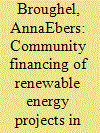

|
|
|
|
|
| Summary/Abstract |
Small-scale investors are gaining recognition as a valuable source of private funding necessary for a successful energy transition. Still, there is limited knowledge about the characteristics of potential investors, especially in community renewable energy projects. This study intends to address this gap and investigates the impact of socio-demographic and socio-psychological characteristics on individuals’ willingness to invest in community renewable energy projects. Our investigation is based on two large-scale representative surveys of 2260 respondents in Austria and Switzerland. The majority of respondents would be willing to invest 1000 to 10,000 CHF/EUR in such a project, with higher amounts in the Swiss sample. Potential investors in Austria tend to be male homeowners with higher incomes, while Swiss investors are more educated. Generally, positive attitudes and beliefs related to renewable energy have a significant impact on investment intention. The largest group of potential investors in both countries can be described as ‘urban wind energy enthusiasts’, who show high acceptance of wind energy installations near their communities. Surprisingly, a significant segment of potential investors is skeptical of a nearby wind installation. Study results can be used by decision-makers to tailor appropriate policy measures and by project developers for communication of the project aims and benefits.
|
|
|
|
|
|
|
|
|
|
|
|
|
|
|
|
| 14 |
ID:
117321


|
|
|
|
|
| Publication |
2013.
|
| Summary/Abstract |
Implementing smart metering is an important field for energy policy to successfully meet energy efficiency targets. From an integrated social acceptance and customer-perceived value theory perspective we model the importance of customer value of smart metering in this regard. We further shape the model on a choice-based conjoint experiment with Swiss private electricity customers. The study finds that overall customers perceive a positive value from smart metering and are willing to pay for it. Further, based on a cluster analysis of customers' value perceptions, we identify four customer segments, each with a distinct value perception profile for smart metering. We find that energy policy and management should integrate a solid understanding of customer value for smart metering in their initiatives and consider different smart metering market segments within their measures.
|
|
|
|
|
|
|
|
|
|
|
|
|
|
|
|
| 15 |
ID:
147404
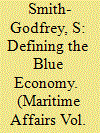

|
|
|
|
|
| Summary/Abstract |
Oceans are increasingly gaining in importance in terms of enabling international trade via linking sellers and buyers. The behaviour patterns of such linking enablers on the oceans are receiving more attention from a regulatory and economic perspective as the relationship between land and ocean evolves in its role and importance. The “Blue Economy” as a concept finds its origin against this background. A literature review is undertaken to analyse an appropriate definition for the Blue Economy. These definitions are analysed in terms of the minimum criteria which are necessary for a Blue Economy. The paper also attempts to structure various types of activities which are associated with ocean services. It is done with a view to identify what one may perceive as the focus areas for the growth of the Blue Economy.
|
|
|
|
|
|
|
|
|
|
|
|
|
|
|
|
| 16 |
ID:
132628


|
|
|
|
|
| Publication |
2014.
|
| Summary/Abstract |
The aim of the paper is to assess linkages between energy consumption and economic growth in the light of compliance with the EU energy policy targets stated in the climate and energy package for 2020 in the European Union member states in the period 1993-2011. The study is divided into two main stages. During the first one, using cluster analysis methods, four groups of countries which met three energy policy targets stated in the package at similar levels were identified. During the second stage, the bootstrap Granger panel causality approach proposed by Kònya (2006) was used to verify the hypothesis of causality between energy consumption and economic growth in the countries from four groups created in the previous step. The global financial crisis was also taken into account. The results obtained reveal that the level of compliance with energy policy targets influences linkages between energy consumption and economic growth. The results indicate causal relations in the group of countries with the greatest reduction of greenhouse gas emissions, the highest reduction of energy intensity and the highest share of renewable energy consumption in total energy consumption. In the remaining groups the results mostly confirm the neutrality hypothesis.
|
|
|
|
|
|
|
|
|
|
|
|
|
|
|
|
| 17 |
ID:
142508
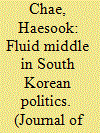

|
|
|
|
|
| Summary/Abstract |
This article explores the role that political ideology played in shaping the outcome of the 2012 presidential election in South Korea. It conceptualizes political ideology as two-dimensional and utilizes cluster analysis to identify distinct ideological groups. By analyzing two sets of survey data collected in 2012, it discovers four ideological groups. A striking result uncovered by the cluster analysis is the change in party identification and voting in favor of the conservative party made by one group in particular—a change that proved to be the competitive edge the conservative party candidate needed to win the fiercely competitive two-way election. In other words, this group served as the fluid middle.
|
|
|
|
|
|
|
|
|
|
|
|
|
|
|
|
| 18 |
ID:
141705
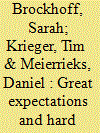

|
|
|
|
|
| Summary/Abstract |
This contribution investigates the role of education in domestic terrorism for 133 countries between 1984 and 2007. The findings point to a nontrivial effect of education on terrorism. Lower education tends to promote terrorism in a cluster of countries where socioeconomic, political, and demographic conditions are unfavorable, while higher education reduces terrorism in a cluster of countries where conditions are more favorable. This suggests that country-specific circumstances moderate the effect of education on terrorism. The results of this study imply that promoting education needs to be accompanied by sound structural change to positively affect (individual and society-wide) development and consequently reduce terrorism.
|
|
|
|
|
|
|
|
|
|
|
|
|
|
|
|
| 19 |
ID:
132596


|
|
|
|
|
| Publication |
2014.
|
| Summary/Abstract |
Due to government subsidies, Brazil has witnessed an increase in the installation and use of small solar water heating systems in low-income housing projects. Although the initiative has reduced the load curve during peak times due to the reduced use of electric showerheads, measurement and verification (M&V) are needed to validate the savings. M&V procedures should take into account the social and economic variability of low-income housing developments. To improve M&V in low-income housing projects, this paper presents a methodology for identifying homogeneous subgroups based on their energy-saving potential. This research strategy involved a cluster analysis designed to improve the understanding of what energy savers and other influencing factors exist. A case study in Londrina Brazil was undertaken with 200 low-income families. Five clusters, created based on savings potential, were defined. The results showed that only two clusters demonstrated good electricity savings, representing 47% of families. However, two clusters, or 37%, did not provide satisfactory savings, and the other 16% did not provide any consumption history due to previous use of illegal city electricity connection practices. Therefore, studies confirm the need for a detailed measurement of the representative subgroups to assess the influence of human behaviour on potential SWHS-induced savings.
|
|
|
|
|
|
|
|
|
|
|
|
|
|
|
|
| 20 |
ID:
192820
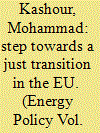

|
|
|
|
|
| Summary/Abstract |
The conceptual and regulatory framework of the European just transition does not consider inequality in household energy consumption. This study addresses the causes of this inequality across the 27 Member States of the European Union (EU) in the period 2010–2020 to contribute to its reduction. To identify these causes, the regression-based inequality decomposition approach is used. The results show that the variation in per capita gross domestic product (GDP), which contributes 38.76% to the inequality of household energy consumption, is the main cause of this inequality. Moreover, the average contribution of GDP per capita in the inequality of household energy consumption is almost negligible in the most developed states. In contrast, it is much higher in the least developed states, suggesting that decoupling between household energy consumption and economic development has not been achieved in all Member States. To promote a just transition to climate neutrality by 2050, the energy transition framework should therefore be broadened to help the least developed states achieve decoupling and align their energy consumption with that of the most developed states.
|
|
|
|
|
|
|
|
|
|
|
|
|
|
|
|
|
|
|
|
|